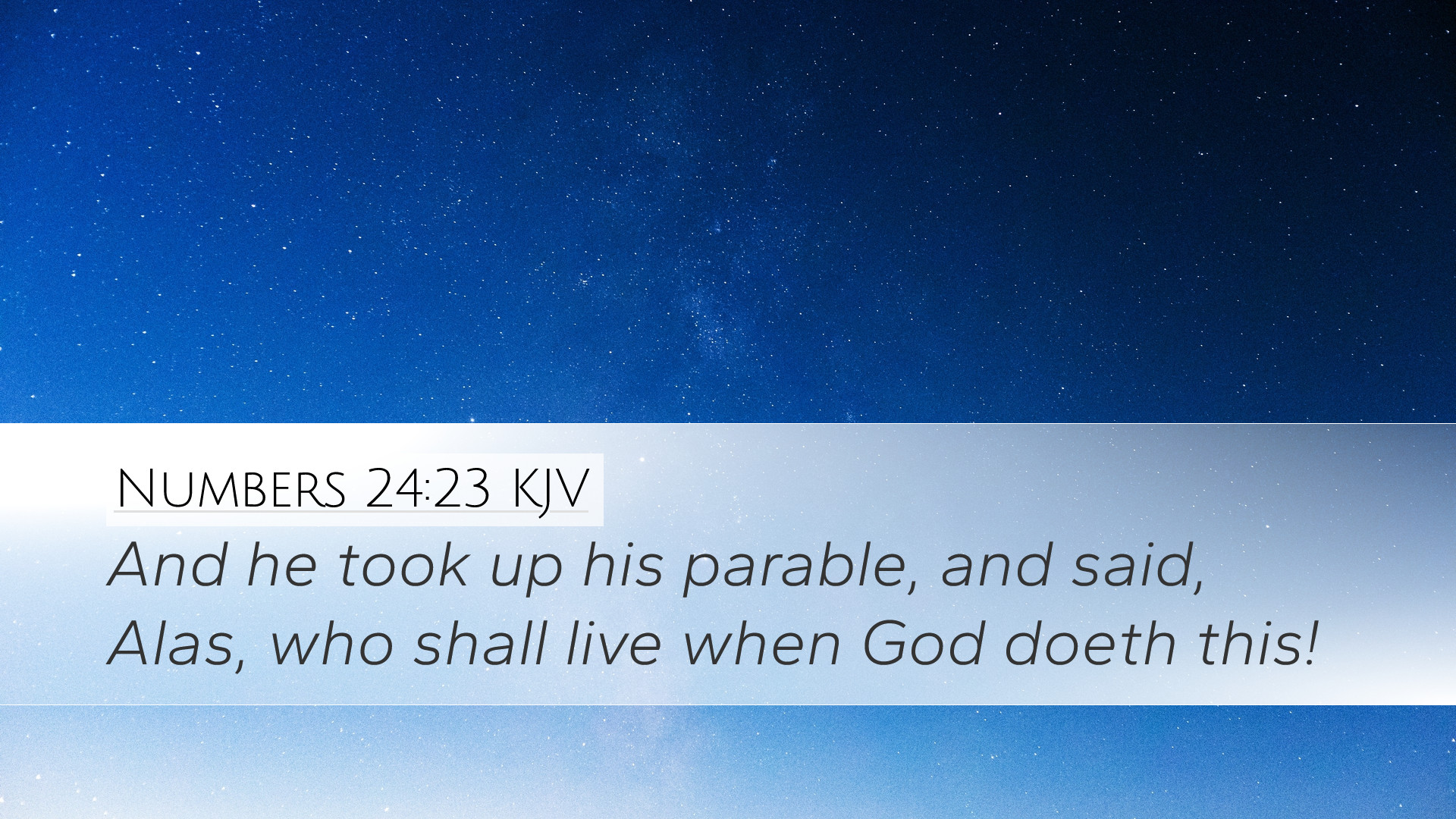Commentary on Numbers 24:23
Numbers 24:23 states: "And he took up his parable, and said, Alas, who shall live when God doeth this?" This verse encapsulates profound themes of prophecy, divine judgment, and the future of Israel and its foes.
Contextual Overview
The Book of Numbers documents the journey of the Israelites in the wilderness, focusing on their preparation to enter the Promised Land. In Numbers 24, Balaam, a non-Israelite prophet, is called upon to curse Israel but instead ends up blessing them, revealing God's protective hand over His chosen people.
Insights from Matthew Henry
Matthew Henry comments on the implications of Balaam's prophecy, highlighting the inherent tension between human desire and divine sovereignty. He states:
- Divine Sovereignty: Henry emphasizes that God's will prevails despite human opposition. Balaam's inability to curse Israel is a testament to God's covenant promise.
- Vulnerability of the Oppressors: The phrase "Alas, who shall live when God doeth this?” indicates the futility of opposing God's plans. It foreshadows the eventual downfall of those who stand against God’s people.
Reflections from Albert Barnes
Albert Barnes provides a more detailed exposition on this verse, focusing on the prophetic nature of Balaam's words. His key observations include:
- The Nature of Prophecy: Barnes stresses that Balaam’s parable signifies an impending divine judgment. It reflects a critical moment of realization for the nations who oppress Israel.
- Judgment and Mercy: He contrasts the impending judgment with the mercy extended to Israel, noting that while destruction awaits the adversaries, Israel continues to receive God’s favor.
Analysis by Adam Clarke
Adam Clarke takes a pastoral approach, probing the applications of Balaam's prophecy for believers today. His insights include:
- Consequences of Rebellion: Clarke notes that the verse serves as a warning against rebellion. The question posed by Balaam can be seen as a desperate inquiry into the fate of those who stand in opposition to God.
- Hope for the People of God: He emphasizes that for the faithful, these words are not merely a lament but a hopeful assurance of God’s protection and ultimate victory.
Theological Implications
The theological significance of Numbers 24:23 extends beyond its immediate context, resonating with themes of judgment and redemption throughout Scripture:
- Judgment on Nations: The verse foreshadows God’s judgment on nations that rebel against Him. This theme recurs in the prophetic literature, signifying that God is sovereign over all nations.
- Hope for Israel: It provides hope for Israel, reminding them of God's fidelity to His covenant. Holders of such promises are assured of divine protection regardless of their circumstances.
Application for Pastors and Theologians
This verse offers several contemplative points for pastors and theologians:
- Preaching Divine Sovereignty: Pastors can use this as an opportunity to preach the sovereignty and faithfulness of God in protecting His people, encouraging believers to trust in God's overarching plan.
- Understanding the Nature of God’s Judgments: Scholars may reflect on how God’s judgments serve both as warnings and as a means of purging sin, focusing on the dual nature of God's righteousness coupled with His mercy.
Conclusion
Numbers 24:23 serves as a poignant reminder of the consequences of standing against God’s purposes. Balaam’s lament underscores the reality of divine judgment while simultaneously affirming the hope found in God's interactions with His people. For modern believers, it challenges each one to consider their own stance with respect to God's will and to remember the protective promises given to those who are faithful.


